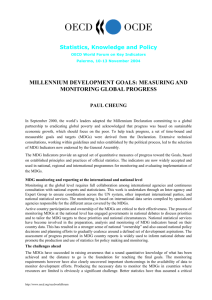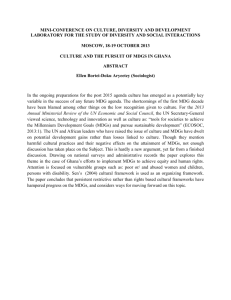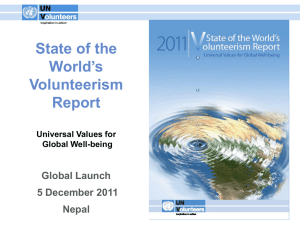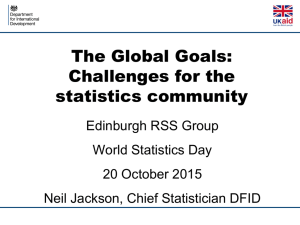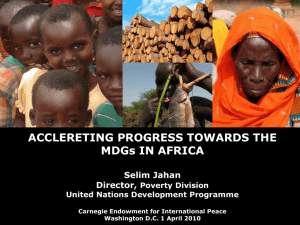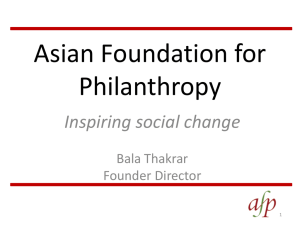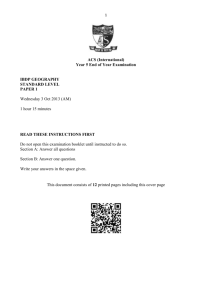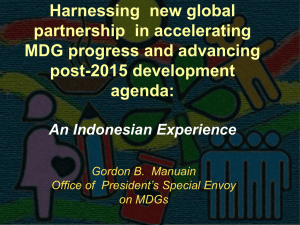Q3 2013 Progress Report
advertisement
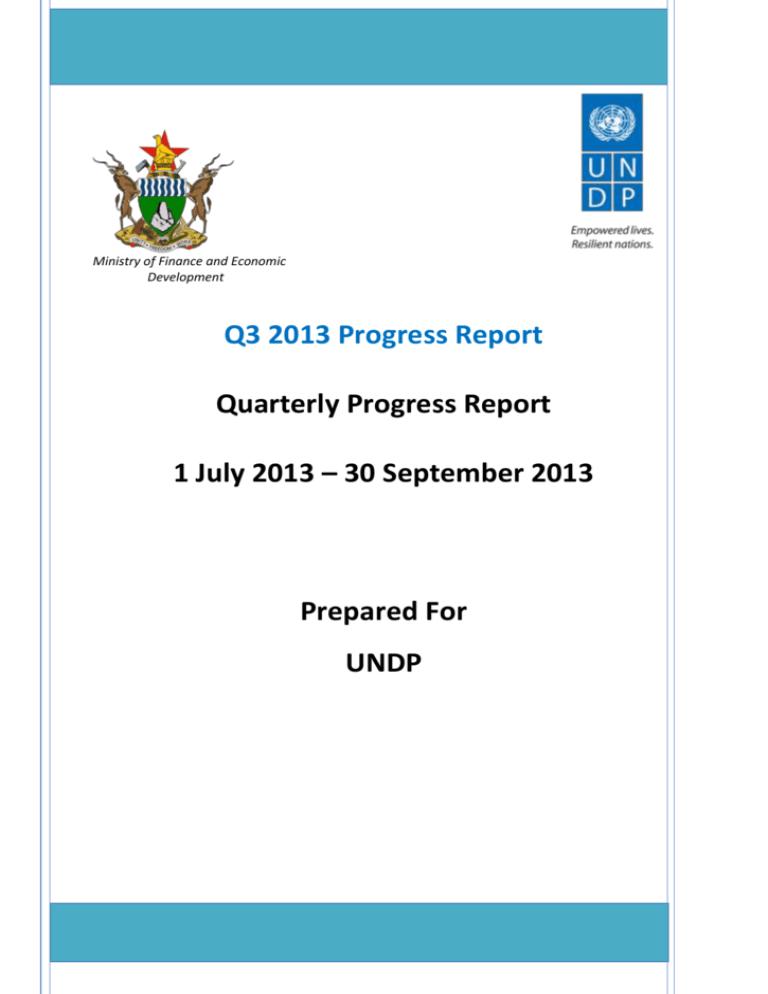
Ministry of Finance and Economic Development Q3 2013 Progress Report Quarterly Progress Report 1 July 2013 – 30 September 2013 Prepared For UNDP Executive Summary This report gives an outline of the overall progress towards project objectives, notable achievements of the project during the reporting period, challenges identified, and changes made in the project to date. KEY ACHIEVEMENTS National Launch of an Investment Handbook Zimbabwe ratified the UN convention on the rights of persons with disabilities Sensitization and engagement of youth and the public on the MDGs Increase of over 400 registered users, the highest incremental gain since the launch of the MDG Virtual Learning Centre. Tangible results in locally led economic recovery with regards MDGs realized On average, progress against targeted activities was very limited in the third quarter of 2013 due to the National Electoral Processes that Zimbabwe was conducting as a whole. Challenges (delays) cited in the risk log at the development of annual work plan were experienced in the implementation of activities. However other set targets were reached and others surpassed. Financial Summary Project Component 1 ,2 and 3 Total MoEPIP expenditure: $ 114823.39 Project Component 4 Total MLSS expenditure: $ 3082.39 Project Component 5 Total NANGO & DRI expenditure: $ 4513.05 + $ 58229.19 respectively =$ 62742.24 Project Component 6 Total SNV expenditure: $ 174663.56 Overall Project Expenditure Total Q2 expenditure : $ 355311.58 Notes* Most expenditure indicated for Q3 is for activities conducted in Q2 but whose paperwork was not complete for processing at the end of Q2. * $173334 is the total advance given to SNV in the 3rd Quarter, as at 30/09/13, $51 126 had been spent. $ 1302.17 plus the advance which adds up to $174663.56 as indicated is for UNDP activities that were charged to the SNV component. 1 Evaluation of Progress during the Reporting Period Project Component 1 - Output 1: Pro-poor policy processes supported and reports produced— Ministry of Economic Planning and Investment Promotion Progress: No progress was made towards this output in the reporting period. All activities had scaled down in preparation and anticipation of the National General Elections. After the elections ministerial project leadership is still unclear therefore no headway has been achieved. Progress achieved against identified targets and indicators for Output 1 for the reporting period: Prepare and publish one economic bulletin : NOT ACHIEVED Organize one brown bag policy dialogue s : NOT ACHIEVED Conduct Policy Research on the investment policy, HRD and Trade Development Strategy:NOT ACHIEVED Conduct Policy research on mining, energy investments and the informal sector : PARTIALLY ACHIEVED Project Component 1 - Output 2: Technical capacities for selected economists in Macroeconomic Policy Analysis Enhanced—Ministry of Economic Planning and Investment Promotion Progress: Interviews for the ICT Support Assistant were held on the 12th of July 2013 and a suitable candidate identified. However, actual recruitment was halted until the future of the ministry is ascertained. Simultaneously, by interviewing the ICT Support Assistant, steps towards the facilitation of LAN connectivity within the Ministry were taken. The Project Coordinator was trained in Methods and Tools for Project Monitoring and Evaluation from 4 -16 August 2013. Changes Affected: The impact of the progress made above will only be realized as and when the ICT Support assistant comes on board. Progress against the target’s indicators for Output 2 for the reporting period: Recruit a national UNV IT Specialist : PARTIALLY ACHIEVED Facilitate LAN Connectivity in the Ministry : PARTIALLY ACHIEVED Facilitate specialized training for Selected Economists on Macroeconomic Policy analysis: NOT ACHIEVED 2 Project Component 1 - Output 3: Draft Investment Promotion Strategy and Action Plan developed— Ministry of Economic Planning and Investment Promotion Progress: An Investment stakeholder conference was held in Victoria Falls on 21-22 August 2013 at the sidelines of the UNWTO. An Investment promotion Policy and Investment Handbook for Zimbabwe have both been produced and finalized and disseminated. Changes Affected: These two policy documents will be able to make practical recommendations on how Zimbabwe in general can improve their international competitiveness and effectiveness in the attraction of foreign direct investment. Progress against the target’s indicators for Output 3 for the reporting period: Hold one Investment Stakeholder Conference : ACHIEVED Develop Draft Investment Promotion Strategy and Action Plan : ACHIEVED Develop Investment Promotion Strategy : ACHIEVED Project Component 2 - Output 1: 2013 MTP Implementation Report developed, published and disseminated—Ministry of Economic Planning and Investment Promotion Progress All activities under this activity were not achieved as the national government unveiled a new economic blueprint , the Zimbabwe Programme for Socio Economic Transformation (ZIMPSET). Progress against the target’s indicators for Output 3 for the reporting period: Recruit Sector Consultants to develop MTP Implementation Report: NOT ACHIEVED Organize Stakeholder meetings and workshops: NOT ACHIEVED Conduct media and 3 provincial outreaches for the MTP : NOT ACHIEVED Publish and disseminate 1000 2013 MTP Progress Reports: NOT ACHIEVED Project Component 3 - Output 1: National MDG Progress report launched and disseminated — Ministry of Economic Planning and Investment Promotion Progress: Additional copies of the 2012 MDG Status Report in the form of booklets and CDs were printed and distributed through project partners particularly as DRI and SNV. Changes Affected: The national report continues to guide critical decisions for future planning amongst various stakeholders. Progress against the target’s indicators for Output 1 for the reporting period: Printing of 1000 2012 MDG Status Report and 2000 CDs: ACHIEVED 3 Provincial dissemination of MDG Progress Report : ACHIEVED Project Component 3 - Output 2: Consultations on post 2015 development agenda —Ministry of Economic Planning and Investment Promotion Progress Dialogue on the Post 2015 Development agenda that had been planned for the 18th of July 2013 at Wild geese Lodge was cancelled at the last minute due to commitments to the preparations for national elections which were held on the 31st of July by key stakeholders. Consequently a task team to lead national preparations for the post 2015 UN development Agenda in consultation with stakeholders was not established as this activity was an outcome of the former. After the elections, no further progress was made on this as clarity on ministerial project leadership was and still is vague. High level meetings at the 68th session of the UN General Assembly were attended by a Zimbabwean delegation which included senior officers from Ministry of Public Service, Labour and Social Services, Ministry of Foreign Affairs and the Zimbabwe UN mission in New York. The sessions attended were the Secretary General’s special event on acceleration efforts being made to the achievement of MDGs, the UN high level political forum on sustainable development and the UN High level meeting on disability and development. The Project supported officials from the Ministry of Labour and Social Services in attending these meetings. Changes Effected The project has not been able to contribute meaningfully to national dialogue on the Post 2015 Development Agenda. At the 68th Session of the UN General Assembly, Zimbabwe ratified the UN convention on the rights of persons with disabilities Progress against the target’s indicators for Output 1 for the reporting period: Organize consultations to inform national debate on the post 2015 UN Development Agenda : NOT ACHIEVED Establish task team to lead national preparations for the post 2015 UN development agenda in consultation with stakeholders: NOT ACHIEVED Participate in one high level international meetings on the post 2015 agenda: ACHIEVED Project Component 4 - Output 1: MDG Accelerated Action Plan (AAP) Launched and implementation monitored -Ministry of Labour and Social Services Facilitate the dissemination of the AAP in 9 Provinces Progress The AAP was disseminated to the 9 provinces through the Ministry of Education Sport Arts and Culture who in turn facilitated the process by making use of their provincial offices. TOR’s for a consultant to undertake the task of developing a monitoring and evaluation framework for the AAP were drafted. However, it was agreed 4 Progress against the target’s indicators for Output 1 for the reporting period: Facilitate the dissemination of the AAP in 9 Provinces: ACHIEVED Develop AAP monitoring and Evaluation framework : NOT ACHIEVED Undertake 2 monitoring visits according to M and E Plan to track AAP Implementation : NOT ACHIEVED Project Component 4 - Output 2: MDGs Resource Centre Operational -Ministry of Labour and Social Services MDGs Resource Centre fully operational with equipment installed and maintained Progress Electrical installation has lagged for the resource center due to bureaucratic procedures for servicing government departments. However carpeting and painting of the resource center in preparation for public use has already been done. Progress against the target’s indicators for Output 2 for the reporting period: MDGS resource Centre fully operational with equipment installed and maintained: PARTIALLY ACHIEVED Project Component 5 - Output 1: The public and community based organizations strengthened to participate effectively in MTP and MDG policy and Practice — NANGO Schools provincial and national debating competition on MDGs organized Progress No progress was made in the reporting period toward this output. This was so because NANGO was seized with efforts to replace the programme officer who was responsible for this activity. However, the recruitment was finalized to fill the vacant position and progress on this activity is expected to scale up in the ensuing quarter. Progress against the target’s indicators for Output 1 for the reporting period: Schools Provincial and national debating competition on MDGs organized : NOT ACHIEVED Project Component 5 - Output 2: Increased Engagement with and awareness to the MDG Virtual Learning Centre —Development Reality Institute 5 Advocacy for the MDG VLC Progress: DRI facilitated the production of various IEC materials for the Millennium Development Goals Virtual Learning Centre. The materials produced were a compact disc with the offline tool, its user manual, a concise booklet discussing the MDGs Academics (2000) component and reproduction of the generic information brochure (2000) for the MDG VLC component as a whole. The materials were distributed during public lectures and marketing exposes of the MDG VLC in tertiary institutions. The MDG-VLC component has intensified a heavy online presence through usage of social media platforms ( twitter and facebook) . Changes Affected: In total there has been an increase of over 400 registered users, the highest incremental gain since the launch of the component last year. The total number of registered users has now risen to 1502, with a total of 637 users having taken the basic course, up from 282 in the last quarter. Market and encourage use of the MDG VLC through at least 3 University & College functions Progress: Marketing of the MDG-VLC was done through five exhibitions at the country’s foremost public Universities. These exhibitions were held at The National University of Science and Technology (NUST), Midlands State University (MSU), Great Zimbabwe University (GZU), Africa University (AU) and Bindura University of Science Education (BUSE) during the orientation weeks of the universities. A total of 1310 students interacted with DRI and the VLC. The key interest from the students around the MDG VLC was to use it as a resource bank for completing assignments as well as creating networks for future employment. In addition, marketing of the VLC was done through an engagement with the Zimbabwe Junior Parliamentarians, who convened at two sites in Bulawayo and Harare over the August school holidays. The exercise, which included a four-hour training session on MDGs, reached 300 young legislators from around Zimbabwe. The link partners in the process with ZJP were The Zimbabwe Youth Council and UNICEF. Changes Effected Efforts to increase the visibility of the mdgs.org.zw site have scored significant successes. The VLC is increasingly becoming a premier source of information on MDGs and related information in Zimbabwe and abroad. Conduct MDG VLC Alumni Meeting Progress The second Alumni Function held on the 17th of September 2013 took stock of on-going discussions and debate on the Post 2015 Development Agenda. The function was well attended by about 110 delegates, majority of whom were also graduands of the MDG-VLC basic course. The conference discussions were guided by a presentation from a leading academic, Dr Charlton Tsodzo, who explored 6 the social and economic dynamics of Zimbabwe’s development beyond 2015. In his paper, titled ‘Post elections Back to the sore thumb’ it was well noted that there is now need for renewed focus on the best way to sustain and surpass economic recovery, leveraging on the country’s competitive advantage such as high literacy levels, minerals and human resources. He further noted investment as the key issue in contributing to manageable sustainable development. Conference discussions centred around three key issues, which were, (i) The need to take stock of progress made to date, compile disaggregated data and analysis, and share it at provincial level. This was highlighted as critical in mobilising collective efforts in achieving the MDGs. The current arrangement of information sharing and generalised reporting was castigated for perpetuating a top-down approach to development. Recommendations were made for a down up approach, which brings on board inclusive growth and access to assessment data at lower level. (ii) The need to explore more innovative technological models/ ways to capture the youth, not only as an abundant resource, but engaging them more effectively in the development agenda, as they are the future. (iii) The discord amongst civil society organisations and failure to galvanise towards toward meeting the Millennium Development Goals. Changes Effected DRI and the project at large benefitted from a lively feedback session on further ways in which the youth could be engaged for the better good. Needs Assessment to Determine Academic institutions needs and preparedness Progress The process that started in the second quarter was completed and a full report submitted by the consultant engaged to undertake the exercise. The final reports flags out key areas and issues, which DRI will need to leverage under the MDG-VLC component to ensure more sustainable and relevant engagement with academic institutions. Changes Effected It is noteworthy that DRI has started implementing some of the recommendations for effective engagement with universities, one of such activities being the public lectures, of which DRI has so far supported two. Consultations with educational stakeholders regarding development of the VLC and tailored courses for academic purposes Progress Two new modules were developed in partnership with the University of Zimbabwe, Department of Urban Planning and The National University of Science and Technology’s Department of Development Studies. The two new modules have been shared among DRI partners within the project for peer review. The modules are expected to be online in the first half of the fourth quarter. Further to the 7 completed modules, discussions are ongoing to bring on board Great Zimbabwe University, in the codevelopment of a module with a specific focus on the MDG number 7. Changes Effected The relevance of UNDP and its partners is slowly being realized by the academia as it is envisaged that through further engagement the modules will be endorsed and integrated into the core-learning curriculum of the universities. Update software & security for MDG VLC maintenance and support Progress: Regular maintenance of the MDG-VLC was undertaken through updating content and uploading new material, such as home page banners, images from the conference, timeline articles and test uploading of the new modules. Efforts are continuing to maintain maximum stability of the platform through regular security checks and consideration of user feedback. Changes Effected MDG visibility is on the increase through updates of events conducted and given in real time through twitter and facebook under the hash tag #mdgzim which is now a permanent link to the updates found on top search engines google and yahoo. Roll out offline tool and Local host CD for 40 secondary schools Progress The offline tool developed in Q2 was distributed to the junior parliamentarians of Zimbabwe during training sessions held by DRI to benefit the young legislators.. Copies of the Offline tool have also been widely distributed in different sectors, which include tertiary institutions and development service organizations for onward transmission Changes Effected While a follow-up process will be done to access progress in cascading information and knowledge from the training sessions, indications show that a good number of the parliamentarians have taken the initiative to register on the MDG-VLC platform Progress against the target’s indicators for Output 1 for the reporting period: Advocacy for the MDG VLC : ACHIEVED Market and encourage use of the MDG VLC through at least 3 University and college functions: ACHIEVED Update software and security for MDG VLC Maintenance and support : ACHIEVED Conduct MDG VLC Alumni Meeting :ACHIEVED Needs assessment to determine academic institutions needs and preparedness : ACHIEVED Consultations with educational stakeholders regarding development of the VLC and tailored courses for academic purposes : ACHIEVED Develop an offline tool and local host CD for 40 Secondary Schools: ACHIEVED 8 Project Component 6 - Output 1 Increased Local Capacity for MDG based planning and implementation — SNV Netherlands Development Organization Progress: Two districts are finalising the preparation of their MDG Acceleration Plans, Umguza (Goals 1; 7; 6 and 5) and Tsholotsho (Goals 1; 2; 7 and 6). Sub district level awareness creation sessions on the MDGs to encourage communities to take responsibility in achieving the MDGs are being undertaken and should be completed early in the next quarter. Tsholotsho started the awareness sessions by convening a workshop on the MDGs for traditional leaders - chiefs and headman. In preparation for the development of MDG acceleration plans, Hwange and Lupane districts have have set up baseline survey data collection teams which are expected to complete the data collection exercise early in the next quarter. They have also adapted the data collection tool which had been developed by the pilot districts, to reflect their own peculiarities and interests. Changes Effected Regarding Goal 7, through the partnerships forged by SNV all the districts have received logistical support through vehicles to aid activities that ease access to water and sanitation facilities under a UNICEF funded programme. Progress against the target’s indicators for Output 1 for the reporting period: Conduct and report on selective MDG progress participatory assessments in 2 districts : ACHIEVED Conduct 2 focused multi-stakeholder seminars to agree implementation strategies : PARTIALLY ACHIEVED Conduct workshops to disseminate the plans at district/local levels : PARTIALLY ACHIEVED Support districts to mobilize own resources to support implementation : PARTIALLY ACHIEVED Project Component 6 - Output 2: Improved planning and budgeting at local authority and District levels for achievement of priority MDGs —SNV Netherlands Development Organization Progress: Revenue collection remains a major challenge in the RDCs. Bulilima RDC reported that in 2012 only 39% of projected revenue had been collected. The Insiza and Umzingwane RDCs had established revenue collection committees to support their Finance committees in revenue generation and collection strategies. These committees were to be oriented during the period under review. However in July, the Minister of Local Government wrote off all debts owed by residents from 2009 to June 2013 in accordance with the RDC Act, making these committees irrelevant. Bulilima and Insiza have reviewed their MDG plans to assess progress and are to share their findings at a wider stakeholder platform in the next quarter. The Umzingwane session to review the MDG plans 9 against the Annual Plans was postponed due to involvement by many of the RDDC members in the national electoral processes. The outcome of the capacity needs assessment for Umguza and Tsholotsho undertaken in conjunction with the Ministry of Local Government Rural and Urban Development (MLGRUD) Capacity Building Programme was unveiled. The emerging capacity issues from all the RDCs have pointed to the necessity of linking the MDG planning process with RBM. Changes Effected The outcome of the capacity needs assessment for Umguza and Tsholotsho undertaken in conjunction with the Ministry of Local Government Rural and Urban Development (MLGRUD) Capacity Building Programme has provided a starting point in solving emerging capacity issues. Progress against the target’s indicators for Output 2 for the reporting period: Assessment of local/district development plans and budget allocation to identify prioritization of MDGs (4 additional districts) PARTIALLY ACHIEVED Assessment of capacity in district planning and budgeting departments for implementation of priority MDGs ( 4 additional districts) PARTIALLY ACHIEVED Develop a capacity building strategy for planning and budgeting including on priority MDG implementation PARTIALLY ACHIEVED Implement capacity building activities/training/mentoring for improved planning and budgeting in 7 districts PARTIALLY ACHIEVED Project Component 6 - Output 3: Community representatives (m/f) and private sector to actively engage in the implementation of MDG Plans —SNV Netherlands Development Organization Progress: SNV completed the summarization of the Mid Term Plan (MTP) for translation to local languages early in the quarter with the intention to use it to enhance awareness on the MTP amongst communities. SNV awaits further guidance on this activity noting that a new Government policy, Zimbabwe Programme for Socio Economic Transformation (ZIMPSET) has been introduced. Bulilima and Umzingwane districts continue to seek other stakeholders such as the private sector to support implementation of MDG activities by tapping on the diaspora resources. Umzingwane prepared a concept paper and assigned 2 members from the RDDC to spear head the process to engage the private sector to support MDG processes in the farming and mining communities As efforts to engage the private sector intensify, SNV has developed a comprehensive inventory of private sector operations/ programmes in the participating districts in terms of on – site operations, inclusive business arrangements, corporate social responsibility initiatives and Community Share Ownership Trusts. The inventory contains 60 medium to large companies operating in Matabeleland. A further breakdown by districts is being completed. SNV together with other agencies is organizing a regional symposium on livelihoods as well as a donor conference to attract support for the implementation of the MDGs. Preparations for the Livelihoods 10 Symposium and Donors Conference are at an advanced stage. Several government officials, ministries, private sector companies, embassies and donor agencies have been engaged and sensitized about the event. The event will provide the perfect platform to engage key private sector companies in participating districts by exposing them to the kind of development challenges in the districts as well as showing them how they can make a difference in these districts. Changes Effected In Tsholotsho a concern noted amongst key stakeholders during the MSPs was that whilst the district is a timber producing area, many nearby schools have a high desk to pupil ratio that compromises the quality of learning and pupil performance. The Council has now embedded Corporate Social Responsibility in concession agreements it signs with the logging companies. It is also noteworthy that the ‘injivas’ i.e. Zimbabweans working in South Africa, through concerted efforts by SNV , bought solar panels for Sikente school in Tsholotsho and fixed broken window panes at the school. The ‘injivas’ have formed development associations in the diaspora where they each contribute at least R100 per month. In another school, Phelela they are contributing towards paying the teachers’ incentives. The Bulilima RDC acknowledges that following the community sensitisation meetings on MDGs, communities have become proactive in participating in projects aimed at achieving the MDGs. These have included Tokwana, Mbimba, Gambo, Temateme, Ngwana and Bezu Rural Health Centres (RHCs) to address the challenges in Goal 5. Also communities in Bulilima now use CAMPFIRE proceeds towards attainment of the MDGs. Previously they would share the proceeds amongst themselves for personal use. In the education sector, the construction of Ntambama primary school was revived with the community rehabilitating a classroom block. The same community is mobilising funding for a teacher’s cottage. Communities have gone further to develop secondary schools as follows: Hingwe secondary school: two classroom blocks are under construction Mazwalige Secondary School: fund raising for the new school by the community is ongoing and pegging and bush clearing has been done Mzwanyana Secondary school: Construction of the school stalled in 2011 but following the MDG awareness sessions in 2012, communities contributed towards the completion of a teachers cottages enabling staff to be engaged and the school was opened in March 2013 Progress against the target’s indicators for Output 3 for the reporting period: Convene MSPs for community representatives to engage on MTP and MDG implementation: PARTIALLY ACHIEVED Organize and facilitate 3 MSPs to foster collaboration on MTP and MDGs : PARTIALLY ACHIEVED Develop and implement strategy for Private sector participation: PARTIALLY ACHIEVED Identify and Conduct Rapid value chain asessments, Opportunity mapping and inclusive business planning, Implementation and post investment support in nine private sector companies PARTIALLY ACHIEVED 11 Project Component 6 - Output 4: Financing mechanism (LCDF) for MDG focused activities assessed and agreed to by stakeholders —SNV Netherlands Development Organization Progress: During the period under review, districts started working on the LCDF operational and procedures manual. This follows the completion of the LCDF Concept draft in July. A governance structure was proposed which has been linked to the structures proposed for the MLGRUD Capacity Building Programme. Participants from the districts met to formulate the guidelines. Stakeholders recommend that a look and learn visit be organized to other similar existing facilities to enable stakeholders appreciate the dynamics in running the facility and factoring them accordingly in line with the Zimbabwe situation. A draft procedures manual is expected to be in place by mid-October. Progress against the target’s indicators for Output 4 for the reporting period: Design governance and management structures for the fund : ACHIEVED Engage with donors and explore interest in the financing mechanism: PARTIALLY ACHIEVED Gender Mainstreaming As with the situation in the second quarter, females still continue to dominate in terms of the MDGVLC participants. This is a plus on the part of the project component as it is known that women are often marginalised and have hindered access to such platforms and opportunities. Completion rates for the basic course are also 33.7% higher among females when compared to their male counterparts. Partnerships DRI has in the last quarter maintained its partnerships as a way of strengthening effectiveness of the MDG-VLC component. There were no new partners engaged in the quarter under review, though inroad have been made in re-affirming working relations with specific departments within Universities, such as the department of Rural and Urban Planning within the University of Zimbabwe, the Department of Development Studies and the National University of Science and Technology (NUST) and the Psychology Society at the Midlands State University. Such engagement has been necessitated by the need to work with multiple entry points in accessing and establishing sustainable working relations within the academic institutions. Within the Project, SNV facilitated some district stakeholders to participate in the DRI supported MDG Virtual Learning Centre graduation ceremony in Harare. SNV intends to strengthen collaboration with DRI such that lessons emerging from the field in SNV programming would be shared through the DRI electronic platforms. Through the project, SNV also established more contacts and partnerships with private sector organisations to collaborate towards the attainment of MDGs. Through the Matabeleland NGO Forum and NANGO, the project maintains linkages with the NGOs and CBOs in the region 12 Challenges The national harmonized elections hindered / delayed the implementation of some activities for all partners. Currently DRI continues to grapple with the ever-increasing need to create safeguards around the MDG-VLC in the form of a more secure server system. The election period has taken a toll on efforts by DRI to broker and cement relations with government departments. Recognizing changes that have taken place in the super structure of government Ministries more will need to be done, and expediently to finalize on pending MOUs and other engagement protocols. At the end of the previous quarter, a Government Directive wrote off all debts owed by residents to councils as from 2009 to June 2013. The impact this had although not fully ascertained is the derailing of the output of one of the planned activities for SNV which is to improve budget performance in the Rural District Councils including enhancing revenue collection. Lessons Learnt The process of developing a baseline prior to the preparation of the MDG Plans has provided Councils with a mechanism of establishing progress in terms of impact of development interventions. However a tool for monitoring and evaluation still requires to be developed. The use of multi stakeholder platforms to agree on priorities has ensured participation by a broader range of stakeholders demystifying planning as solely a technical process. 13 14
